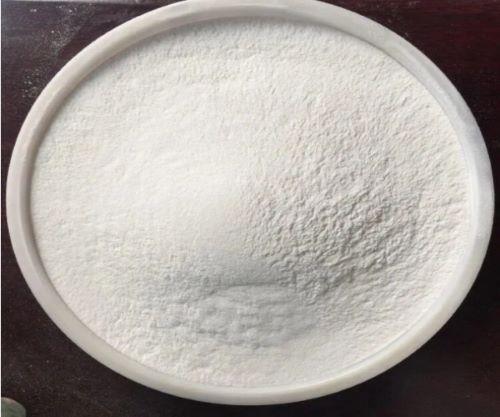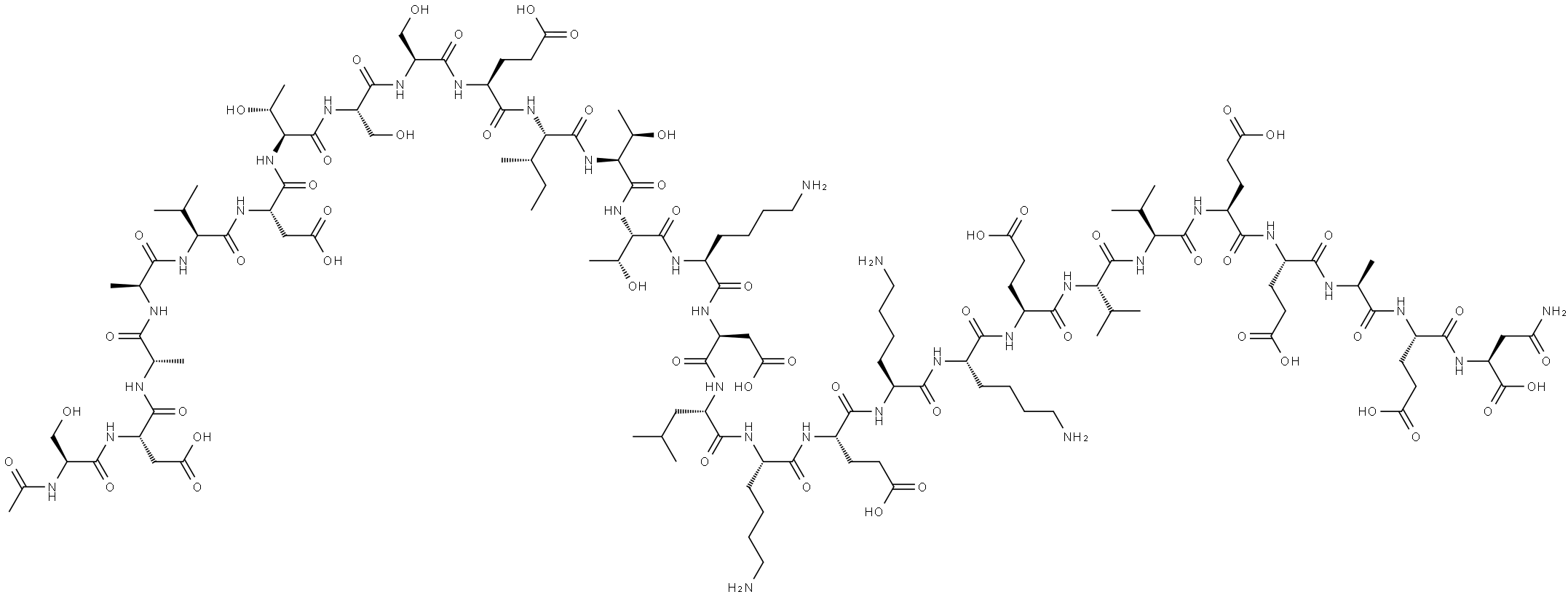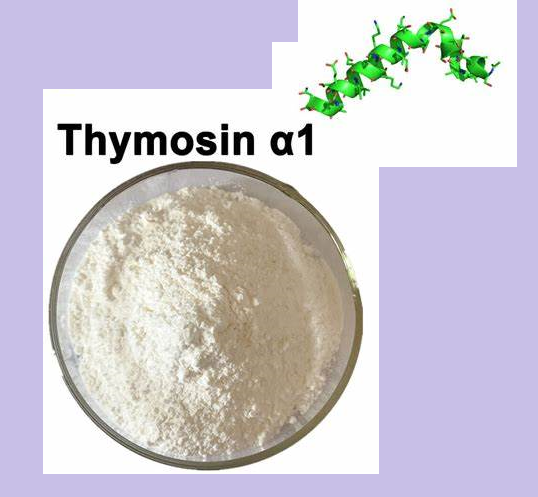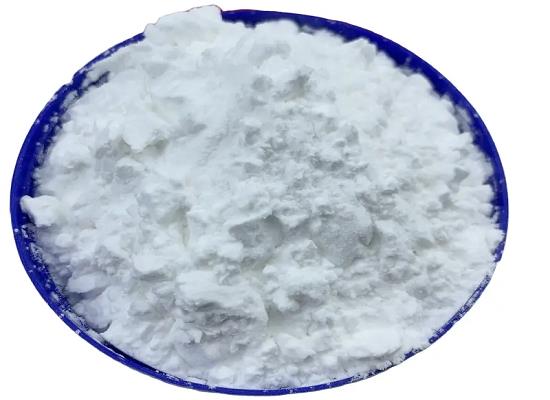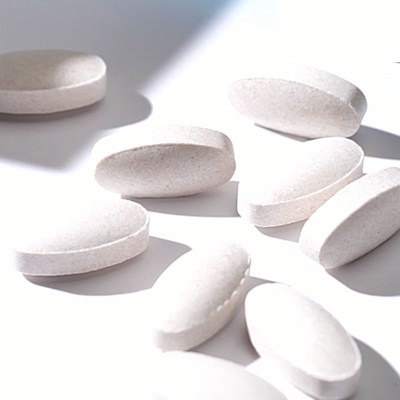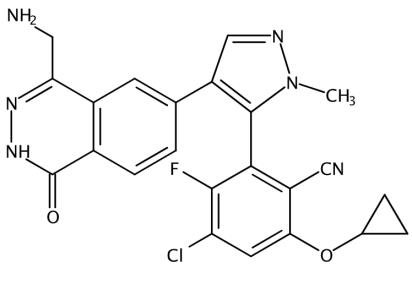A comprehensive review of Thymosin alpha 1
General Description
Figure 1. Proporties of Thymosin alpha 1
Thymosin alpha 1 is a 28 amino acid peptide originally isolated from the thymus, which has been extensively studied in terms of its functions in the immune system. Thymosin alpha 1 has long been recognized as an immune enhancing, immune modulating, as well as an immune restoring agent, and as such it has been utilized in several clinical and research settings. The synthetic form of thymosin alpha 1, thymalfasin, is approved in more than 35 countries for the treatment of hepatitis B and C and as an immune enhancer in several other diseases.1,2
BIOCHEMISTRY
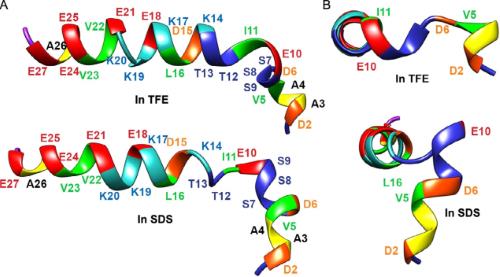
Figure 2. (A) NMR-derived structures of thymosin α1 protein in 40% TFE solution and in a membrane-like environment with SDS micelles. (B) Same structures rotated 90 degrees.
Thymosin proteins are short, positively charged, and inherently unregulated peptides. Induction of thymosin protein configuration via organic reagents, such as trifluoroethanol, hexafluoroisopropanol, dodecyl trimethylammonium bromide, and Zn2+ ions, charges the proteins neutralizing them at a low PH to potentiate their absolute effects.3 The nuclear magnetic resonance structure of thymosin alpha 1 has been determined by mixing in 40% trifluoroethanol/60% water (v/v) solvent. The study has determined 800 MHz of a polypeptide chain consisting of 28 residues. To comprehend its distinct structure, multiple molecular trials with solvent composed of 40% trifluoroethanol/60% transferable intermolecular potential with 3 points water (v/v) were utilized to create a three-dimensional configuration of the peptide. Ultimately, it was able to depict a distorted helical configuration with two stable regions: Alpha-helix site from 14-26 residues and two double turns in the β region in the N-terminal site consisting of 12 residues.4
BIOLOGICAL ACTIVITIES
Thymosin alpha 1 has a wide range of biological activities that range from antitumor to immune-modulating properties (Figure 1). The immune response of thymosin alpha 1 is due to its action in elevating the activity of T cell maturation into CD4+/CD8+ T cells. It works to directly activate natural killer cells as well as CD8+ T cells through which it kills virally infected cells. Thymosin alpha 1 has a negative effect on IL-1β and tumor necrosis factor-α, which in turn leads to a decreased inflammatory response and is quite beneficial in conditions such as chronic hepatitis and acute pancreatitis. Not only does it play a role in enhancing cytokine expression, but it also increases the prominence of major histocompatibility complex I/viral antigens on their respective target infected cells and decreases viral replication. Naylor and his associates pointed out that thymosin alpha 1 does not only have one but rather a varied range of targets for its immune-enhancing activity.Thymosin alpha 1 has exhibited the ability to restrain tumor growth, hence its use in the treatment of various cancers. It has anti-proliferative properties which have been exhibited in lung and liver tumor metastases. According to studies conducted by Moody et al, the anti-tumor activity of thymosin alpha 1 worked best with small tumor size. Overall, thymosin alpha 1 works via two main mechanisms: Either stimulating the immune system or employing its anti-proliferative activities on tumor cells. The protective action of thymosin alpha 1 against oxidative damage as a result of its effect on liver superoxide dismutase and glutathione peroxidase has been explored by Armutcu et al.5,6
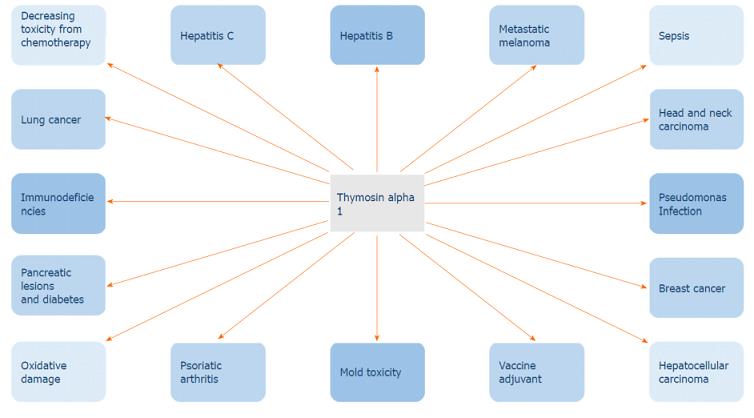
Figure 2. Thymosin alpha 1 has a wide range of biological activities
Since thymosin alpha 1 is a polypeptide naturally present in the thymus, it plays a fundamental role in the control of inflammation, immunity, and tolerance. Thymosin alpha 1 has an immune-modulating action through its interaction with toll-like receptors. Due to the action of thymosin alpha 1 on other cell types, it is used as a therapeutic agent for diseases with evident immune dysfunction. Clinical trials with thymosin alpha 1 for diseases like DiGeorge syndrome, non-small cell lung cancer, hepatocellular carcinoma, hepatitis B and C, HIV, and melanoma have been conducted and yielded promising results. FDA approved the orphan drug thymalfasin (Zadaxin) for treatment of malignant melanoma, chronic active hepatitis B, DiGeorge anomaly with immune defects, and hepatocellular carcinoma due to its immunomodulatory and anti-tumor effect.7
Clinical Applications
Hepatitis C
Thymosin alpha 1 as a monotherapy does not seem to be useful in treating hepatitis C infection. However, combination therapy of thymosin alpha 1 and pegylated interferon alpha 2a could effectively repress viral replication in hepatitis C patients. Thymosin alpha 1, in combination with interferon-alpha 1 has also been tested for treatment in patients with chronic hepatitis C. Moreover, thymosin alpha 1 is well tolerated, with no significant adverse effects observed. A meta-analysis conducted by Sherman, included many trials showing the superiority of the combination of thymosin alpha 1 and interferon alpha 1 compared to interferon alpha monotherapy[30]. It remains important to note that similar to Hepatitis B, the treatment of Hepatitis C with thymosin alpha 1 has been discontinued in favor of direct antiviral agents.8
Hepatitis B
The safety and efficacy of thymosin alpha 1 in patients with chronic hepatitis B have been tested through clinical trials. Thymosin alpha 1 has been tested as monotherapy as well as in combination with interferon-alpha and other nucleoside analogs. There has been found a complete virological response rate [clearance of serum hepatitis B virus deoxyribonucleic acid and hepatitis B e antigen] of 40.6% in patients given 1.6 mg subcutaneous injection twice a week and 26.5% in patients given the same regimen for 52 wk. However, it is important to note that treatment of Hepatitis B using thymosin alpha 1 was only used in the era of interferon and is now obsolete in the era post-discovery of direct antiviral agents.9
HIV infection
Thymosin alpha 1, interferon alpha 1, and zidovudine combination therapy has been well-tolerated in HIV patients. Thymosin alpha 1 enhances the function and increases the number of CD4+ T cells, while it also decreases viral load. Thymosin alpha 1 influences thymic T-cell output. The safety and efficacy of thymosin alpha 1 in combination with highly-active antiretroviral therapy in stimulating immune reconstitution has been proven. It has been shown that thymosin alpha 1 is well tolerated, and could dramatically increase the levels of signal joint T cell receptor excision circles in patients with advanced HIV disease. Prolonged use of high-dose thymosin alpha 1 is more effective.2
Immune deficiency
Treatment with thymosin alpha 1 serves as a stimulus for IL-2 receptor expression and IL-2 internalization. It also has a restoring effect on patients with a suppressed lymphokine-activated killer cell activity and with immunodeficiency. Acting through Toll-like receptors in both myeloid and plasmacytoid dendritic cells, thymosin alpha 1 stimulates the signaling pathways and initiates the production of immunerelated cytokines. Thus, thymosin alpha 1 is anticipated to bring about encouraging results in the treatment of immunocompromised patients. Overall, it improves immune system function without causing adverse events.10
Applications in oncologic patients
Multiple studies have shown promising results for the use of thymosin alpha 1 in patients with metastatic melanoma, head and neck carcinoma, lung cancer, breast cancer, and hepatocellular carcinoma. Thymosin alpha 1 is indicated as adjuvant for chemotherapy-induced immune depression, immune insufficiency, and immune suppression in patients[5]. In addition, it has been shown that thymosin alpha 1 in combination with chemotherapy or radiation improves survival rate in patients with non-small cell lung cancer, which accounts for 85% of all lung cancers and is known for its low responsiveness to chemotherapy.11
SAFETY AND DOSES
Thymosin alpha 1 is usually found in an injection form and is commonly prescribed by a primary care physician. Thymosin alpha 1 is usually administered twice a week via a subcutaneous route. The standard single dosage ranges from 0.8 to 6.4 mg, while multiple doses range from 1.6 to 16 mg for five to seven days. Utilized in various illnesses such as liver disease, cancer, and autoimmune diseases, thymosin alpha 1 has been shown to be well-tolerated and safe.12
STORAGE OF THYMOSIN ALPHA 1
Thymosin alpha 1 should be stored at -20oC. Lyophilized thymosin alpha 1 may remain stable for up to three weeks at room temperature; however, for long term storage, it should be kept below -180oC and stored in the desiccated form. When ready to use, it may be reconstituted and subsequently stored at 40oC for a period of two to seven days. If the intention is to store thymosin alpha 1 for a longer period of time, then it is advised to store it in combination with a carrier protein such as 0.1% human serum albumin or bovine serum albumin. It is recommended to avoid repeated freezing and thawing.13
References
1.Camerini, R., & Garaci, E. (2015). Historical review of thymosin α 1 in infectious diseases. Expert Opinion on Biological Therapy, 15(sup1), 117-127.
2.Matteucci, C., Grelli, S., Balestrieri, E., Minutolo, A., Argaw-Denboba, A., Macchi, B., ... & Garaci, E. (2017). Thymosin alpha 1 and HIV-1: recent advances and future perspectives. Future microbiology, 12(2), 141-155.
3.Hoch, K., & Volk, D. E. (2016). Structures of thymosin proteins. Vitamins and Hormones, 102, 1-24.
4.Elizondo-Riojas, M. A., Chamow, S. M., Tuthill, C. W., Gorenstein, D. G., & Volk, D. E. (2011). NMR structure of human thymosin alpha-1. Biochemical and biophysical research communications, 416(3-4), 356-361.
5.Li, J., Liu, C. H., & Wang, F. S. (2010). Thymosin alpha 1: biological activities, applications and genetic engineering production. Peptides, 31(11), 2151-2158.
6.Moody, T. W. (2007). Thymosin α1 as a chemopreventive agent in lung and breast cancer. Annals of the New York Academy of Sciences, 1112(1), 297-304.
7.Armutcu, F., Coskun, ?., Gürel, A., Kanter, M., Can, M., Ucar, F., & Unalacak, M. (2005). Thymosin alpha 1 attenuates lipid peroxidation and improves fructose-induced steatohepatitis in rats. Clinical biochemistry, 38(6), 540-547.
8.Eckert, K., Schmitt, M., Garbin, F., Wahn, U., & Maurer, H. R. (1994). Thymosin α1 effects, in vitro, on lymphokine-activated killer cells from patients with primary immunodeficiencies: preliminary results. International journal of immunopharmacology, 16(12), 1019-1025.
9.Sherman, K. E. (2010). Thymosin α 1 for treatment of hepatitis C virus: promise and proof. Annals of the New York Academy of Sciences, 1194(1), 136-140.
10.King, R., & Tuthill, C. (2016). Immune modulation with thymosin alpha 1 treatment. Vitamins and hormones, 102, 151-178.
11.Costantini, C., Bellet, M. M., Pariano, M., Renga, G., Stincardini, C., Goldstein, A. L., ... & Romani, L. (2019). A reappraisal of thymosin alpha1 in cancer therapy. Frontiers in oncology, 9, 873.
12.Ancell, C. D., Phipps, J., & Young, L. (2001). Thymosin alpha-1. American journal of health-system pharmacy, 58(10), 879-885.
13.Thymosin alpha 1 steroid [Internet]. Mybiosource.com. [cited 2020 September 27]. Available from: https://www.mybiosource.com/steroid/thymosin-alpha-1/639043.
Related articles And Qustion
See also
Lastest Price from Thymosin α1 manufacturers
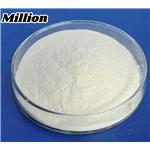
US $1.00/kg2025-11-06
- CAS:
- 62304-98-7
- Min. Order:
- 0.10000000kg
- Purity:
- 99%
- Supply Ability:
- 200kg
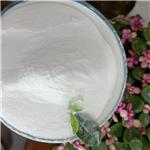
US $10.00/box2025-10-17
- CAS:
- 62304-98-7
- Min. Order:
- 1box
- Purity:
- 99
- Supply Ability:
- in stock
